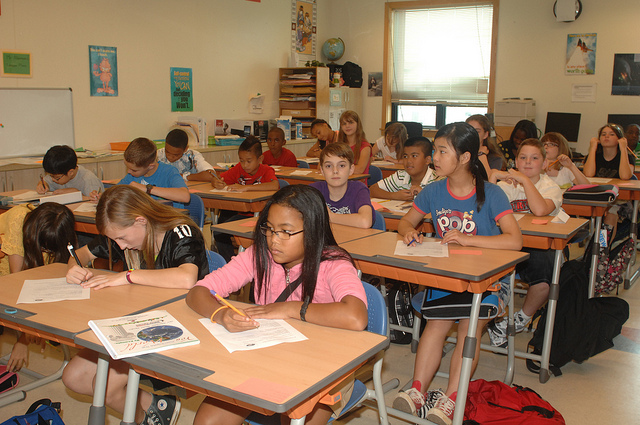5 Advancements in Special Education You Should Know About
It is estimated that over 6.5 million children in the U.S. have disabilities. Meeting the needs of these students poses special challenges. This is one area of education that is a priority for many people and entities. In this article, I will talk about five advancements and findings that are specifically related to special education in this country.
- Special education preschoolers learn better in mainstream settings.
A study from Ohio State University found that preschoolers categorized as having special needs or disabilities learned more with at least some time in mainstream classrooms than outside of it.
“We found that children with disabilities get a big boost in their language scores over the course of a year when they can interact with other children who have good language skills,” said the study’s co-author and a teaching professor, Laura Justice.
To reach these conclusions, 670 preschool children enrolled in 83 different programs were observed and analyzed. Of those numbers, half had a disability. Classrooms with a combination of special education and mainstream students, as well as classrooms with 100 percent special education students were studied and compared.
In the classrooms where special education students were placed among more highly-skilled peers, language scores were 40 percent higher at the end of the preschool year than those in special-needs only classrooms. The study also found that the mainstream students were not negatively impacted by the presence of special needs students, and showed the same levels of improvements as previous classes with no special needs students.
According to the U.S. Department of Education, about half of the nation’s special needs preschoolers are in classrooms with higher-skilled peers, but as this study points out, all preschoolers could benefit from the inclusion.
- D.C. has worked to change special education in their schools.
In 2014, the District of Columbia Council moved forward with three bills to revamp special education in the city. The bills will work together to provide more information for parents of special needs students and to speed up the process of receiving services.
Most significantly, the legislation would reduce the amount of maximum time between a referral and when an evaluation must take place from 120 days to 60 days. The 120-day mandate is the longest in the nation.
Early intervention programs would also receive extra support and resources, and the transition to adulthood classes will begin at the age of 14 instead of the previous 16. Parents would also receive more rights as a result of the bills, with the ability to be allowed to observe current or future classrooms of their children.
Charter schools would also be encouraged to develop special-needs programs with a new preference in enrollment lotteries for students that a have a disability that their school specializes in addressing.
In D.C., over 13,000 students are classified as having disabilities that impact their studies, and only one in five are proficient in reading (only one in four are proficient in math).
- Bethune-Cookman University aims to create more special education teachers.
Bethune-Cookman University in Daytona Beach, Florida received a $1.25 million grant from the Office of Special Education and Rehabilitative Services through the U.S. Department of Education that will be used to launch a program called Project Child. The initiative aims to graduate 70 master level special education teachers through a fully online program to meet the growing demand for these educators.
The Council for Exceptional Children reports that there are 49 states, including Florida, with a shortage of teachers in classrooms where there are 6 million children or youth with disabilities.
According to The Daytona Beach News-Journal online, Willis Walter, dean of the school’s college of education said, “There is a critical shortage throughout the nation. And one of the ways that we’re hoping to assist with that battle is giving more students an incentive to go into the field.”
- The U.S. Department of Education has raised the bar in measuring special education benchmarks.
Factors like state graduation rates and test scores will now be considered more heavily when determining which states are helping, and what states are failing, their special education students.
States that are unable to meet the new benchmarks set forth for three years or more could face losing some of their special education funding.
How difficult will it be for states to achieve the benchmarks when it comes to special education students? To put it in perspective, 41 states met the requirements of the old system. Under the new requirements, only 18 states meet the standards.
In speaking about the reason for this shift in policy, U.S. Secretary of Education Arne Duncan implied that by setting a higher bar for special education achievements, students will benefit.
“We know that when students with disabilities are held to high expectations and have access to the general curriculum in the regular classroom, they excel. We must be honest about student performance, so that we can give all students the supports and services they need to succeed,” he said.
- The mayor of New York vowed to fix the special education reimbursement program.
Mayor Bill de Blasio assured state lawmakers that his administration would streamline the process of applying for and receiving aid for families with special education students who chose private school programs. Though NYC public schools do offer special education programs, some families feel that the specific disabilities and skill levels cannot be met through the public school offerings.
The mayor’s verbal commitment came just shy of the State Assembly nearly passing a law that would force de Blasio to change the system in favor of families with special education needs. The bill already passed the State Senate. Among other things, the legislation would put an end to the annual review process that forces families to re-enter their information and paperwork for reimbursement.
New York State Assembly Speaker Sheldon Silver, who spoke directly to de Blasio, says that the Assembly will pass the bill if the NYC administration falls short of its promises on the matter.
The latest bill came after a string of others with similar intent over the past three years — none of which have passed. Among the opponents to the removal of the annual review process was the New York State School Boards Association that argued that the yearly requirement is necessary since children’s needs change over time. In addition to special education families, New York City’s Orthodox Jewish Community supports easier reimbursement for private and religious school tuition for the special education students that need it.
I think that any reimbursement program outside the public school system that uses tax dollars should be subject to scrutiny, but it seems the families of special education students are facing unfair treatment. I hope that de Blasio is able to live up to his promises regarding the streamlining of this process.
I am excited to see all the efforts to improve special education in our country — special education is a necessary component of education.





